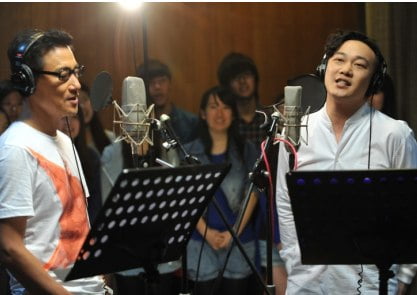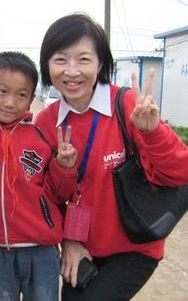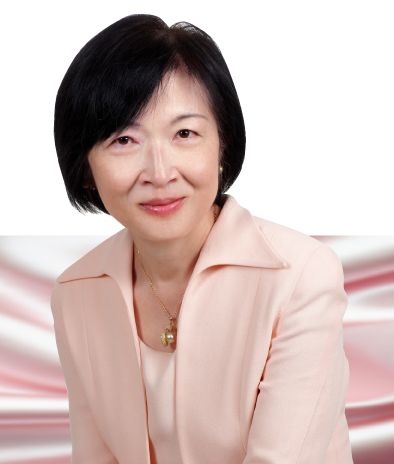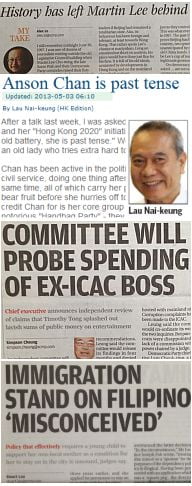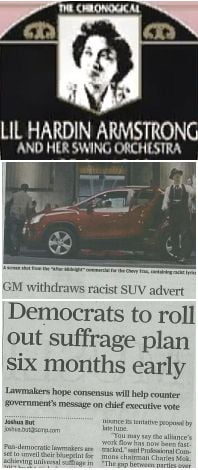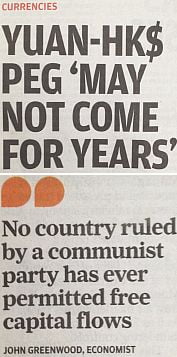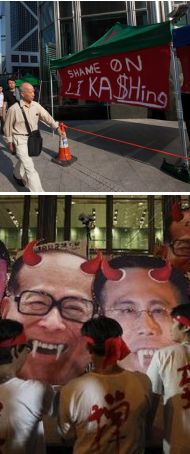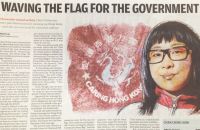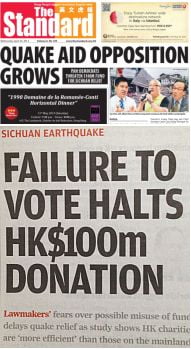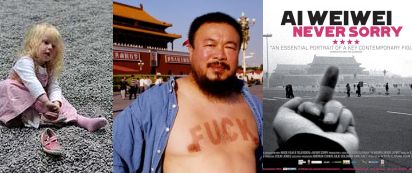 The observant and alert may have noticed a recent outbreak of particularly enigmatic Hong Kong government posters in locations usually reserved for exhortations to Look After Your Grandparents’ Teeth and Stamp Out Dangerous Bicycle Riding Now. The minimalist design simply says ‘Home Hong Kong’ and ‘Hong Kong, Our Home’ in Chinese and English respectively.
The observant and alert may have noticed a recent outbreak of particularly enigmatic Hong Kong government posters in locations usually reserved for exhortations to Look After Your Grandparents’ Teeth and Stamp Out Dangerous Bicycle Riding Now. The minimalist design simply says ‘Home Hong Kong’ and ‘Hong Kong, Our Home’ in Chinese and English respectively.
At first I thought it was some sort of all-purpose propaganda they use to fill empty billboards after the Kids Say Yes to Healthy Websites announcements get taken down, before the re-launch of the Stop Blowing Chickens’ Backsides campaign. Then I noticed a logo tucked away in the corner, and one of those funny barcode things you can’t use unless you have the right app, which no-one does. Still, I shrugged and walked on. Probably some subliminal message about dangerous trees.
Then a week or so ago, I heard some public service radio ad breathlessly extolling the wonder and excitement of something called the Hong Kong Games. And a day or so later some senior government officials had their photos taken cleaning a wet market. Still I thought nothing of it all – just random occurrences. And then yesterday I happened to overhear a conversation in which someone mentioned Gracie Foo. Gracie Foo, as we all know, is Deputy Secretary for Home Affairs. Someone mentioned in passing that Gracie is Convenor of the Hip Hong Kong Working Group.
My curiosity got the better of me, and now everything is starting to fall into place.
Behold the HK Our Home Campaign. Launched by Minister of Everything Carrie Lam with great, but sadly little-noticed, fanfare on April 23. It does not require additional funding, Carrie insisted, and ‘is not a sign of negative sentiments’ – as if anyone would imagine otherwise. To do their bit, pop icons Jackie Cheung and Eason Chan sang from the heart, which may well be a first for them. The campaign runs for the rest of this year, no less, and is divided into four colour-coded themes: Hip Hong Kong, Vibrant Hong Kong, Caring Hong Kong and, of course, Fresh Hong Kong, each under the experienced convenor-ship of a Director or Deputy Secretary of a relevant bureau. Gracie she’s-so-cool Foo’s Hip Hong Kong is, as we would expect, all about nurturing young people’s leadership and commitment. Funky or what? As Charles Ramsey would no doubt tell Gracie, “You gotta have some pretty big testicles to pull this one off, bro’.”
But wait! There’s more! In fact, an incredible 480 events (all compiled here) are coming our way as part of the ‘HK Our Home’ Campaign. Looking through the list, it becomes clear how Carrie can deliver such a bloated package of activities with no extra funding: they were all going to happen anyway. Beach-cleaning, for example. The inaugural berthing at the Kai Tak cruise terminal sounds especially desperate. (Yippee! More tourists!) I look forward to the ‘no-waste lifestyle’ promotion, no doubt organized by the same people who thought up the Zhuhai Bridge and HK$60/70/80 billion Kowloon-Shenzhen High-Speed Hole. And, just in case senior citizens thought they could enjoy a bit of peace and quiet in their retirement, there’s an ‘Opportunities for the Elderly Project’. The grassroots are also going to get hassled, courtesy of the Shatin Methodist Church ‘Lord’s Grace in Neighbourhood’ bash. Even a Correctional Services Department bar-bending training course for convicts gets dragged into the sprawling attempt to apply the ‘HK Our Home’ brand to everything.
And just 18 days to go to… Positive Energy Day. Details are still to be announced, but basically on May 26 Carrie Lam will march into your home with her sleeves rolled up, drag you out of your bed and beat you with a rattan cane until you smile and agree that there are no negative sentiments.
While Working Group Convenors and their underlings rush around slapping the ‘HK Our Home’ logo on everything, 7 million people are asking the inevitable question: What is actually going on here? They can debate two possibilities.
Either the Chief Executive nagged the civil servants for some sort of press-button-make-city-instantly-cheerful miracle plan, and, unaware of the imminent arrival of the morale-boosting giant Rubber Duck, they produced this large-scale but otherwise default, cookie-cutter condescending publicity exercise because they can do no other.
Or desperately underworked bureaucrats eager to justify their air-conditioning allowances by Serving the Community to death pestered the Chief Executive with a vast, loopy patronizing quasi-promotion to make the Big Lychee oh-so Happy and Harmonious, and he swiftly agreed in order to get them out of his hair (I mean, offered enthusiastic backing).

